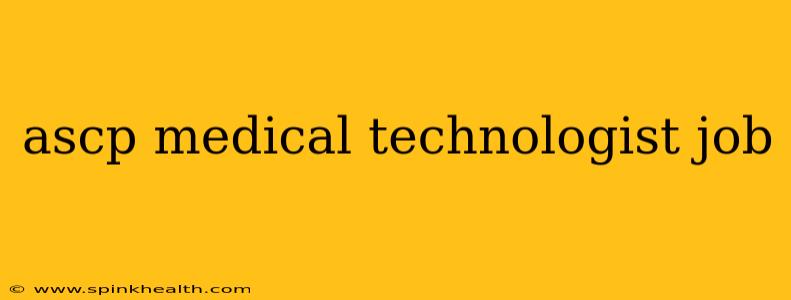Landing Your Dream ASCP Medical Technologist Job: A Journey From Classroom to Lab
The journey to becoming a successful ASCP-certified Medical Technologist is a rewarding one, filled with rigorous training and a deep commitment to patient care. But landing that first job after all your hard work? That's where the real adventure begins! This isn't just about finding a job; it's about securing the right job, one that aligns with your career goals and provides opportunities for growth. Let's navigate the path together.
What Does an ASCP-Certified Medical Technologist Do?
Before we dive into the job hunt, let's clarify what exactly an ASCP-certified medical technologist does. These highly skilled professionals are the backbone of clinical laboratories, performing a wide range of tests on patient samples—blood, urine, tissue, and more. Their work directly impacts patient diagnosis and treatment, making accuracy and precision paramount. They analyze results, identify abnormalities, and communicate their findings to physicians, contributing significantly to patient care. It's a demanding yet profoundly fulfilling career.
What Skills and Qualities Do Employers Look For in ASCP Medical Technologists?
Employers seek more than just certification. While your ASCP certification is the golden ticket, you need to showcase a compelling combination of hard and soft skills. Think:
- Technical Proficiency: A deep understanding of laboratory techniques, equipment operation, and quality control procedures. Your ability to perform various tests accurately and efficiently is crucial.
- Analytical Skills: The ability to interpret complex data, identify patterns, and draw accurate conclusions is essential for effective diagnosis.
- Attention to Detail: Precision is paramount in this field. Even the smallest error can have significant consequences.
- Problem-Solving Skills: Medical technologists often encounter unexpected results or equipment malfunctions, requiring them to troubleshoot effectively.
- Communication Skills: Clear and concise communication with physicians and other healthcare professionals is critical for ensuring accurate patient care. This includes both written and verbal communication.
- Teamwork: Laboratory work often involves collaboration with other technologists and technicians. A collaborative spirit is essential.
How Can I Make My Resume and Cover Letter Stand Out?
Your resume and cover letter are your first impressions. Make them count! Highlight your relevant skills and experience, quantifying your accomplishments whenever possible. Instead of simply stating that you performed blood tests, quantify your success by mentioning the number of tests you processed efficiently and accurately. Use keywords relevant to the specific job description. Tailor your resume and cover letter to each application, emphasizing the skills and experiences most relevant to the particular job posting.
What are the Best Resources for Finding ASCP Medical Technologist Jobs?
The search for the ideal position starts with a strategic approach. Here are some key resources:
- Professional Networking: Attend industry conferences and connect with professionals in your field. Networking can lead to unadvertised job opportunities.
- Online Job Boards: Sites like Indeed, LinkedIn, Monster, and professional association job boards are excellent starting points.
- Hospital Websites: Check the career pages of hospitals and medical centers directly.
- Recruiters: Specialized healthcare recruiters can connect you with job opportunities that might not be publicly advertised.
What Salary Can I Expect as an ASCP Medical Technologist?
Salary varies depending on experience, location, and employer. Researching salary ranges in your area will give you a realistic expectation. Professional organizations often provide salary surveys to guide your expectations.
How Can I Prepare for a Medical Technologist Job Interview?
Practice answering common interview questions, focusing on your skills and experiences. Be prepared to discuss situations where you had to problem-solve or work under pressure. Research the organization you're interviewing with to demonstrate your interest and understanding of their work. Demonstrate your passion for patient care and your commitment to accuracy and precision.
What are the Career Advancement Opportunities for ASCP Medical Technologists?
The path doesn't end with your first job. Many medical technologists pursue advanced roles, such as supervisors, lab managers, or specialized positions within specific areas of laboratory medicine. Continuing education and professional development can open doors to exciting career advancements.
Landing your dream ASCP medical technologist job requires preparation, persistence, and a well-defined strategy. By leveraging your skills, networking effectively, and presenting yourself confidently, you can embark on a fulfilling career dedicated to improving patient health and well-being. Remember, this is your journey—own it and make it remarkable!

